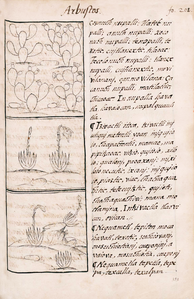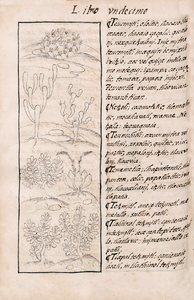Agave : Différence entre versions
De PlantUse Français
(→Liens) |
|||
| Ligne 79 : | Ligne 79 : | ||
*[http://mansfeld.ipk-gatersleben.de/pls/htmldb_pgrc/f?p=185:45:1329164412874601::NO::P7_BOTNAME,P7_DB_CHECKBOX1,P7_DB_CHECKBOX2,P7_DB_CHECKBOX4:Agave,,, Mansfeld] | *[http://mansfeld.ipk-gatersleben.de/pls/htmldb_pgrc/f?p=185:45:1329164412874601::NO::P7_BOTNAME,P7_DB_CHECKBOX1,P7_DB_CHECKBOX2,P7_DB_CHECKBOX4:Agave,,, Mansfeld] | ||
*[http://herb.umd.umich.edu/herb/search.pl?searchstring=Agave%20sp Moerman, Native American Ethnobotany] | *[http://herb.umd.umich.edu/herb/search.pl?searchstring=Agave%20sp Moerman, Native American Ethnobotany] | ||
| − | |||
*[http://www.hort.purdue.edu/newcrop/nexus/Agave_nex.html NewCrop Purdue] | *[http://www.hort.purdue.edu/newcrop/nexus/Agave_nex.html NewCrop Purdue] | ||
*[http://www.theplantlist.org/tpl1.1/search?q=Agave Plant List] | *[http://www.theplantlist.org/tpl1.1/search?q=Agave Plant List] | ||
Version actuelle en date du 10 octobre 2021 à 15:07
Biologie
Classification
Espèces
- Agave amaniensis
- Agave americana
- Agave angustifolia
- Agave asperrima
- Agave atrovirens
- Agave cantala
- Agave cantula
- Agave decipiens
- Agave deserti
- Agave fourcroydes
- Agave kewensis
- Agave lechuguilla
- Agave lophantha
- Agave mapisaga
- Agave palmeri
- Agave parryi
- Agave quiotifera
- Agave salmiana
- Agave schottii
- Agave shrevei
- Agave sisalana
- Agave striata
- Agave tecta
- Agave tequilana
- Agave utahensis
- Agave victoriae-reginae
- Agave vivipara
- Agave xylonacantha
Histoire
Sahagún, 1540-1585, livre 11 fo 200r, Historia general de las cosas de nueva España.
Sahagún, 1540-1585, livre 11 fo 200v, Historia general de las cosas de nueva España.
Sahagún, 1540-1585, livre 11 fo 201r, Historia general de las cosas de nueva España.
Sahagún, 1540-1585, livre 11 fo 201v, Historia general de las cosas de nueva España.
Usages
De nombreuses espèces ont été étudiées pour la production d'hécogénine, tigogénine et smilagénine, des sapogénines stéroïdiennes d'intérêt pharmaceutique. Parmi elles, Agave amaniensis, americana, aurea, avellanidens, cantala, cerulata, cocui, goldmaniana, lechuguilla, shawii, sisalana et Furcraea macrophylla.
Références
- Berger, A. 1915. Die Agaven. Verlag von Gustav Fischer, Jena, Germany.
- Buchanan, Ashley. Agave - An Ancient Plant with an Intoxicating History. Dumbarton Oaks, 2021. Plant Humanities
- Colunga-García, Marín, P. and F. May-Pat. 1993. Agave studies in Yucatan, Mexico. I. Past and present germplasm diversity and uses. Econ. Bot., 47: 312–327.
- Colunga-García, Marín, P. and F. May-Pat. 1997. Morphological variation of henequén (Agave fourcroydes, Agavaceae) germplasm and its wild ancestor (A. angustifolia) under uniform growth conditions: diversity and domestication. Amer. J. Bot., 84: 1449–1465.
- Colunga-García, Marín, P., E. Estrada-Loera, and F. May-Pat. 1996. Patterns of morphological variation, diversity, and domestication of wild and cultivated populations of Agave in Yucatan, Mexico. Amer. J. Bot., 83: 1069–1082.
- Colunga-García, Marín, P., J. Coello-Coello, L.E. Eguiarte, and D. Piñero. 1999. Isozymatic variation and phylogenetic relationships between henequén (Agave fourcroydes) and its wild ancestor A. angustifolia (Agavaceae). Amer. J. Bot., 86: 115–123.
- Dewey, L.H. 1929. A new variety of henequen without prickles. J. Wash. Acad. Sci., 19: 415–416.
- Dewey, L.H. 1931. Sisal and henequen, plants yielding fiber for binder twine. Circular No. 186, United States Department of Agriculture, Washington, D.C.
- García-Mendoza, A.J., 2012. México, país de magueyes. Suplemento "La Jornada del campo". La Jornada, sábado 18 de febrero del 2012, no. 53, p. 4. en ligne
- Gentry, H.S. 1982. Agaves of Continental North America. Univ. of Arizona Press, Tucson.
- Guillot Ortiz, D. and P. van der Meer. 2006. Un nuevo taxón alóctono potencialmente invasor para la flora Ibérica, Agave sisalana var. armata Trel. Stud. Bot., 25: 139–141.
- Piven, N.M., F.A. Barredo-Pool, I.C. Broges-Argáez, M.A. Herrer-Alamillo, A. Mayo-Mosqueda, J.L. Herrera-Herrera, and M.L. Robert. 2001. Reproductive biology of henequen (Agave fourcroydes) and its wild ancestor Agave angustifolia (Agavaceae). i. Gametophyte development. Amer. J. Bot., 88: 1966–1976.
- Robert, M.L., K. Yoong Lim, L. Hanson, F. Sanchez-Teyer, M.D. Bennett, A.R. Leitch, and I.J. Leitch. 2008. Wild and agronomically important Agave species (Asparagaceae) show proportional increases in chromosome number, genome size, and genetic markers with increasing ploidy. Bot. J. Linn. Soc., 158: 215–222.
- Rogers, G.K. 2000. A taxonomic revision of the genus Agave (Agavaceae) in the Lesser Antilles, with an ethnobotanical hypothesis. Brittonia, 52: 218–233.





